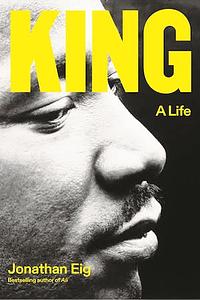Take a photo of a barcode or cover
challenging
emotional
hopeful
informative
inspiring
reflective
sad
tense
medium-paced
informative
slow-paced
Incredibly informative and presents a wonderfully human view of a man so often treated as a saint or mythological figure.
challenging
emotional
hopeful
informative
inspiring
reflective
medium-paced
More new information than I thought there was going to be, although the general strokes are the same as other books on MLK and the civil rights movement. I think most of what I knew previously came from [b:The Sword and the Shield: The Revolutionary Lives of Malcolm X and Martin Luther King Jr.|51719756|The Sword and the Shield The Revolutionary Lives of Malcolm X and Martin Luther King Jr.|Peniel E. Joseph|https://i.gr-assets.com/images/S/compressed.photo.goodreads.com/books/1566292838l/51719756._SX50_SY75_.jpg|72907215].
"At times I think I'm a pretty unprepared symbol. But people cannot devote themselves to a great cause without finding someone who becomes the personification of the cause."
We all think we know Martin Luther King, Jr. We still use him as a symbol today - we post cherry-picked quotes on Martin Luther King Day; people on opposite sides of the political spectrum both use his words to add heft to their points of view. But who was he, really?
Eig makes a darn good effort to portray King as he really was: a great man, burdened by the responsibility put on his shoulders, yet perhaps the only one who could be so effective a face to the movement. I'm also glad Eig doesn't paint over his faults (all the affairs...ugh). At 550+ pages, it's a beast of a biography (and heavy to hold if you're reading the physical book). Well done to Eig for making it surprisingly engrossing.
Things that surprised me:
-The lengths they FBI (specifically, J. Edgar Hoover) went to to try and stop him (they wiretapped him, recorded his affairs, then sent him a compilation tape!) and how overt they were in saying they were trying to stop the movement.
-I didn't know King's brother and mother both died violently.
-I came away with a new appreciation for Coretta Scott King. She was just as much an activist as he, but sacrificed her own ambitions to be a wife and mother (roles he expected her to play), holding everything together at home while he traveled near-constantly.
-I hadn't realized how far King was waning in popularity in the last few years before his death. He was an early and vocal detractor of the Vietnam War when it was still popular with most of the nation. And with the Civil Rights Act passed and integration taking hold in the south, he turned his attention toward the more subtle forms of racism like housing discrimination in northern cities like Chicago. An attempt to start a movement in Chicago put him on the receiving end of such vitriol that even he was shocked. "Most Americans are unconscious racists," he concluded. What would he think of things today as we continue to deal with the more subconscious and systemic forms of racism? If he had lived, would his words be as popular as they are in his death?
A very good biography.
We all think we know Martin Luther King, Jr. We still use him as a symbol today - we post cherry-picked quotes on Martin Luther King Day; people on opposite sides of the political spectrum both use his words to add heft to their points of view. But who was he, really?
Eig makes a darn good effort to portray King as he really was: a great man, burdened by the responsibility put on his shoulders, yet perhaps the only one who could be so effective a face to the movement. I'm also glad Eig doesn't paint over his faults (all the affairs...ugh). At 550+ pages, it's a beast of a biography (and heavy to hold if you're reading the physical book). Well done to Eig for making it surprisingly engrossing.
Things that surprised me:
-The lengths they FBI (specifically, J. Edgar Hoover) went to to try and stop him (they wiretapped him, recorded his affairs, then sent him a compilation tape!) and how overt they were in saying they were trying to stop the movement.
-I didn't know King's brother and mother both died violently.
-I came away with a new appreciation for Coretta Scott King. She was just as much an activist as he, but sacrificed her own ambitions to be a wife and mother (roles he expected her to play), holding everything together at home while he traveled near-constantly.
-I hadn't realized how far King was waning in popularity in the last few years before his death. He was an early and vocal detractor of the Vietnam War when it was still popular with most of the nation. And with the Civil Rights Act passed and integration taking hold in the south, he turned his attention toward the more subtle forms of racism like housing discrimination in northern cities like Chicago. An attempt to start a movement in Chicago put him on the receiving end of such vitriol that even he was shocked. "Most Americans are unconscious racists," he concluded. What would he think of things today as we continue to deal with the more subconscious and systemic forms of racism? If he had lived, would his words be as popular as they are in his death?
A very good biography.
dark
informative
inspiring
reflective
sad
medium-paced
challenging
emotional
informative
reflective
sad
medium-paced
challenging
dark
emotional
hopeful
informative
inspiring
reflective
sad
tense
medium-paced
challenging
informative
medium-paced
challenging
informative
inspiring
reflective
tense
medium-paced

